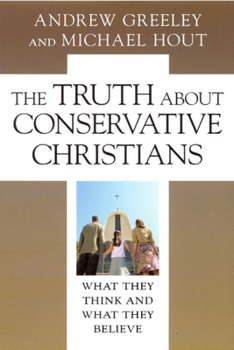The Truth about Conservative Christians: What They Think and What They Believe
Select Format
Select Condition 
Book Overview
Ever since the reelection of President Bush, conservative Christians have been stereotyped in the popular media: Bible-thumping militants and anti-intellectual zealots determined to impose their convictions on such matters as evolution, school prayer, pornography, abortion, and homosexuality on the rest of us. But conservative Christians are not as fanatical or intractable as many people think, nor are they necessarily the monolithic voting block...
Format:Hardcover
Language:English
ISBN:0226306623
ISBN13:9780226306629
Release Date:October 2006
Publisher:University of Chicago Press
Length:216 Pages
Weight:0.95 lbs.
Dimensions:0.9" x 5.8" x 8.7"
Customer Reviews
2 ratings
Should be requred for left-wing idelogues - and everyone else
Published by Thriftbooks.com User , 18 years ago
Stereotypes are a convenient shorthand for the ignorant. They allow a person to communicate a favored interpretation of a group in a word or two. "Fundamentalist Christian", for example, is often used perjoratively to describe a group that is imagined to possess intense religious beliefs and live according to very restrictive and narrow beliefs. In this book, which is composed almost entirely of statistical tables, authors Greeley and Hout put that stereotype to the test the validity of the stereotype. It is fascinating reading. The authors define Conservative Christianity as a religious movement whose "[m]embers seek a religious practice consistent with a relatively small number of basic principles tht are rooted in scripture". The widely held and broadcast stereotype is that "Conservative Christians are a juggernaut bent on undoing liberty, equality and the fraternity of nations. Power-mad hypocrites, the mask hate with love, a judgmental streak with pieties, exclusion with appeals to inclusion and monoculture in the name of diversity." And that's one of the nicer left-wing stereotypes of the Conservative Christians. The authors, both social scientists, announce that their mission is to deliver "facts about Conservative Christians". And they do. Thy provide 172 pages of data drawn from surveys and studies conducted over the past several decades. Among the many myths destroyed is that all Conservative Christians vote for Republicans. In fact, only 7 percent more of them vote for Republicans than what the authors deem Mainline Protestants. The range of subjects studied by the authors is impressive. Statisics and statistical analysis can be terribly dry. To their credit, the authors manage to keep it interested for the dedicated reader. Unfortunately most readers will not be that dedicated. It would have been a fine service if the authors had provided something of an executive summary presenting all of their findings in bullet form. The less-motivated reader would at least be able to take away the highlights. For those who seriously seek understanding, this book is highly recommended. Jerry
Great empirical study of evangelicalism in America
Published by Thriftbooks.com User , 18 years ago
The authors do an outstanding job of using empirical data to show how complex the evangelical subculture really is. Although not an evangelical, I had long suspected that the movement's de facto leadership glossed over many of its internal differences and divisions. The data largely bear this out. Some of the data in the book amount to little more than interesting trivia. For example, more than half of single evangelical adults do not practice sexual abstinance. But in addition to such trivia, the book also uncovers broader trends within the movement. For example, the views of educated, white-collar evangelicals track very differently on many issues from those of less educated working-class evangelicals. After reading this book, I wondered whether evangelical leaders even understand the people who sit in their pews every week. For the past several years I have been trying to find a book that would help me to understand what makes evangelicalism tick. I read several books written by evangelicals and non-evangelicals. All painted the evangelical subculture as monolithic, but none gave the same picture. After reading this book I got my answer as to what makes the evangelical subculture tick: nothing in particular. Evangelicals seem to vary a lot depending on their level of education, their degree of wealth, their professions, and their zip code.





